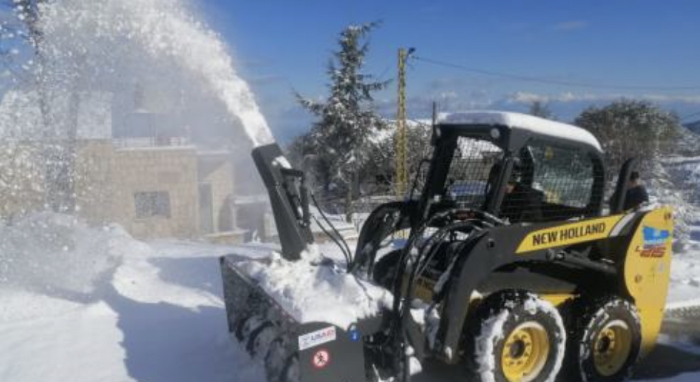Fulfilling Essential Public Service Needs In North Lebanon
“We overcame the scary darkness we used to live in. Women and children are not afraid to go out after dark like before. Finding Niha is not a challenge anymore for a new visitor; we’re using the streetlights as a way to identify the location of the village.”
After losing his job during Lebanon’s economic crisis, Youssef Fahed returned to his hometown of Niha to discover that it lacked basic services and had no municipal council to advocate on behalf of the residents. In the small village, which has fewer than 30 permanent households, extensive power cuts meant that residents would go up to 16 hours a day without street lighting. At night, the dark streets made residents feel unsafe. In addition, the village could afford garbage collection services only once a week, leaving trash to fester in the open and attracting wild animals. After heavy winter snowstorms, Niha did not have the equipment to plow roads properly; adults missed work and kids missed school, sometimes for up to a month.
Mr. Fahed, who is a member of a small committee that manages Niha’s affairs in place of a municipal council, sensed frustrations growing in his community as the residents saw neighboring areas benefiting from the same services that they lacked. Worried that the dilapidated infrastructure could lead to bigger problems in the village, he reached out to a local NGO called Footprints to seek USAID’s assistance.
Together with Footprints, CSP stepped in to address Niha’s public service needs. In the winter, the program provided the village with a skid snowblower to plow its roads, which Fahed’s committee was able to put to use immediately following an unexpected snowstorm. “It was the first time in our lives snow was removed from the narrow roads,” Fahed says.
In the months that followed, USAID’s Community Support Program (CSP) fixed the village’s 45 steel waste barrels and made lids for them to stop the smell of trash and prevent wild animals from getting into them. The program also installed 85 LED streetlights to illuminate the roads and improve residents’ sense of security. To better ensure the equipment’s long-term sustainability and give residents a sense of ownership in the project, CSP trained local workers to safely operate and maintain the lights.
A few months after the activity’s completion, Mr. Fahed says CSP’s intervention has directly improved the lives of at least 540 residents. He expects another 500 people to benefit from it as Lebanon’s economic crisis compels others like him to return to Niha from urban areas.
In the winter, he says, “we were able to remove the snow on a daily basis.” When the snow melts, the village is now open and accessible. “Lighting starts from the entrance of Niha and goes to all the houses, and the kids are not afraid to stay out and play basketball after sunset. People are keeping the bins next to their houses and throwing the garbage inside because the bins no longer smell,” Fahed says.
This activity is part of a larger USAID-backed initiative to provide a broad range of support to underserved and vulnerable communities to improve the delivery of essential services and enhance economic opportunities, primarily in Lebanon’s North, South, and Beqaa regions.



